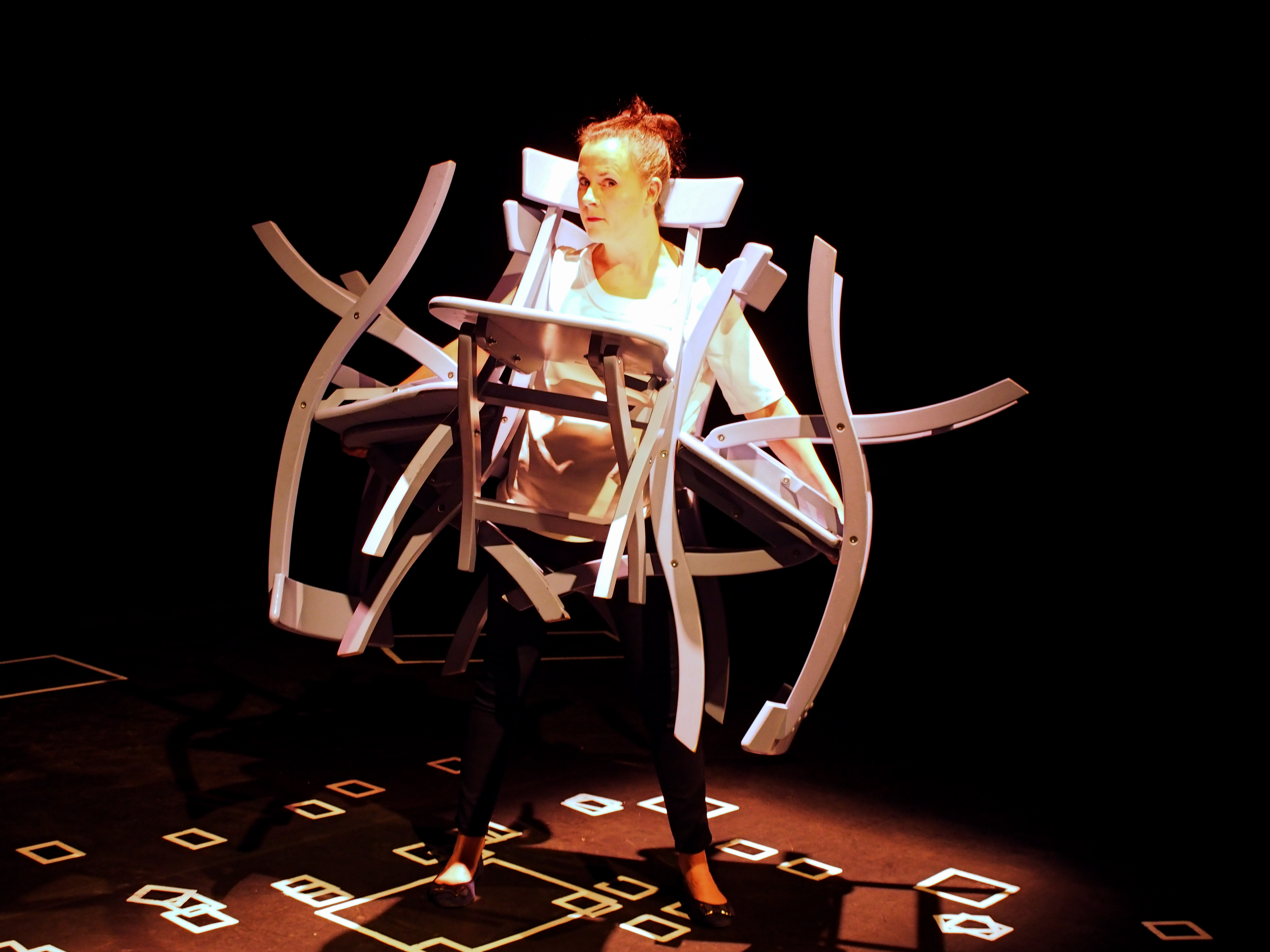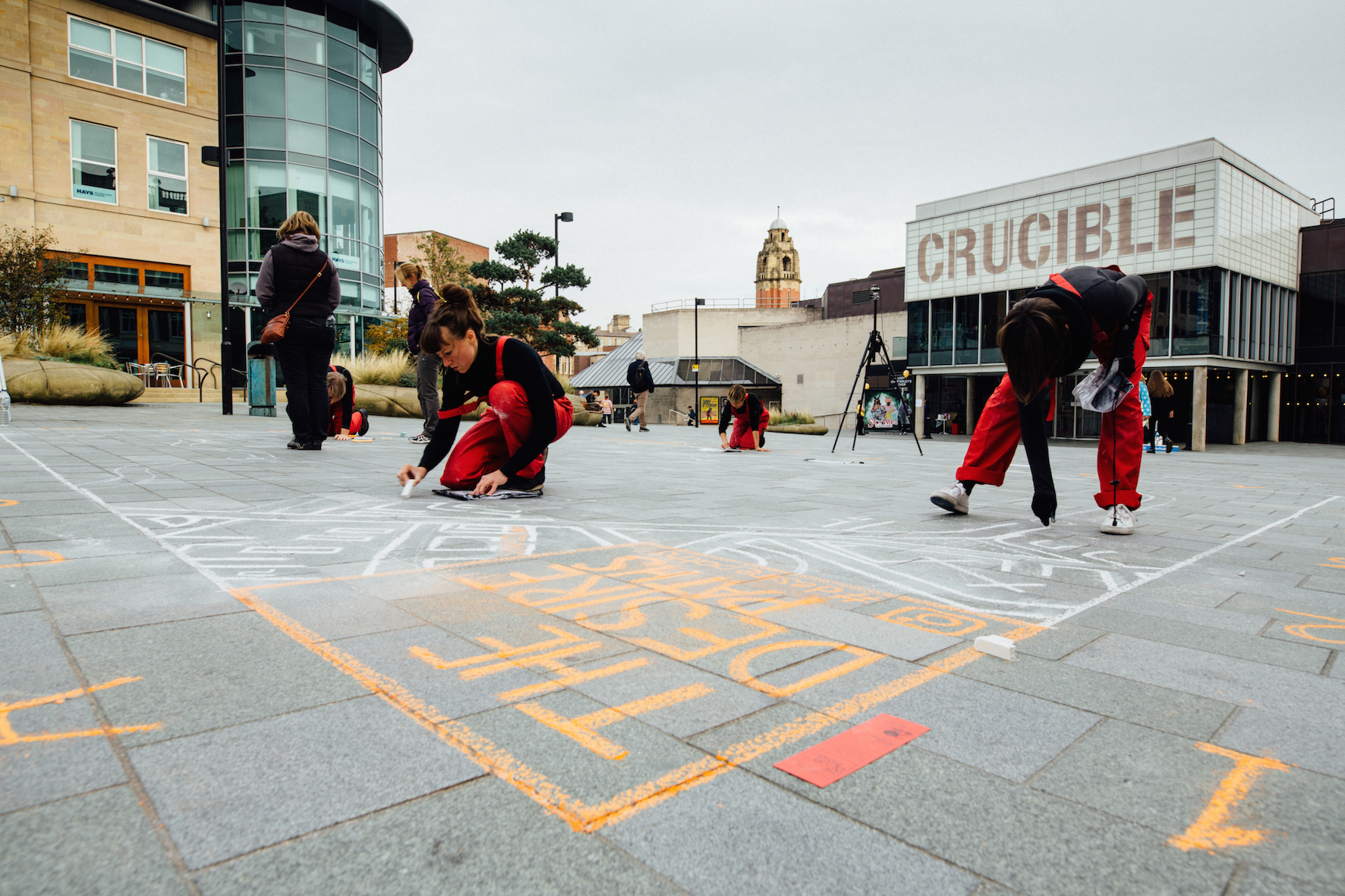Inspiration Exchange: The Story of the Day
InDialogue at Nottingham Contemporary, 21 Nov 2019
This is the second time I’ve run an Inspiration Exchange in The SHED. The first time was in Derby in the summer. We had the Shed in its open configuration – as much outside as inside. Today, it’s autumn-almost-winter. The Shed is in its fully closed set-up and we have heaters inside. It is cosy in the afternoon, when we usually have five or six people in at any one time. For The Story of the Day summing up performance at the end of the day, there are at least 25 of us squeezed in around the table. Many of the people who shared a story have come back, and everyone else is a delegate at the InDialogue symposium which the Exchange is part of.
Once everyone is inside, we close the door and I welcome them all to the Exchange. And then I say something like this.
**
Before we start, I am thinking about coincidence.
This is a themed Inspiration Exchange. The Exchange has shifted shape many times over the last nine years: multiple artist/storytellers, a ‘closed-loop’ group of artists, even some phone / email exchanges in advance or as a follow up. But usually the format is this, me and a set of story cards.
My rule is that in each starting line-up there is at least one story given to me from every other iteration of these ‘solo’ Exchanges. But I have not done a themed version before. My good friend and sometime collaborator Hannah Nicklin did adapt the format for her own themed version of the Exchange, Games We Have Known And Loved, which I was really happy about (you can get Hannah’s Zine of it here.) But I’ve never done it myself before.
Today’s theme is Site Place and Location. So I have been back through the list of stories, all of the stories that have even been in the exchange and selected the ones that related to place in some way. Sometimes place is really significant, in others it is a more tangential element.
But in looking for stories of Place, something I notice is that the Exchange does like coincidence. In our recent show The Department of Distractions, Lockhart, the boss, says to new recruit, Daphne:
People love coincidences don’t they? They love to tell each other about them. They think they are clues. That they are evidence of something else. That they have meaning.
And so before we start, I’m thinking about that. About coincidence, about serendipity, about cause and effect. The right place at the right time. I am wondering, as I’ve already noticed it, if this will turn out to be another theme of the day.
I have prepared 28 story cards, but as you can see, only 24 cards fit on the table. This happens sometimes – changing the ratio of the grid means one or two cards don’t make it. I always feel bad for the stories on the table that don’t get chosen. But what of the story titles written but then left unused on the subs’ bench?
I leave
HOW THE CHURCH BELLS WORK
SEAGLASS
TEN POUND POM
and GOTCHA
off the table.
As it turns out, coincidence is not one of the themes that emerges particularly strongly. This is an Exchange that features phone boxes, love stories, the iconic versions of countries we know, particularly America and Scotland, and people, and the good things that they can do.
I swap 01369 870 212
for TEENAGE LOVE
Both of these are phonebox stories. In Teenage Love phoneboxes are windows to memories of travel, and love stories, even if they (phonebooks) do frequently smell of urine. In one scene that is particularly romantic to this UK audience, our storyteller arrives off the bus in Times Square (in the 1980s, I think) and has to find a phinebox to let her boyfriend know she has arrived in New York so he can come meet her.
However. Here’s a thing.
01369 870 212, the title of the starting story, is the phone number of this phonebox:

But I was back there this summer to find that the phone has been removed. It feels like the story title should be the number of a working phonebox, so on the way in to the Exchange this morning I found a new phonebox and prepared an extra card, 0115 950 6369. Which is the phone number of this phonebox on Lower Pavement in Nottingham:

I swapped DESIRE PATHS
For DESIRE BEFORE MOBILE PHONES
In which our narrator, a photographer, makes her own desire line across a crowded night club to ask her friend to introduce her to a beautiful guy she has had her eye on for a while. They make a date to meet up, choosing a field they both know, out of town. On the day, neither of them can find each other, and because they don’t have mobile phones yet, they cannot call to say where are you…?
I swapped THE WILD CEILIDH
For DOWN AND OUT IN EMBANKMENT
Another love story set in the days before mobile phones, and featuring lovers meeting at transport hubs, and one of them doing a chimpanzee impression on top of a phone box, and this is the moment they fall in love. Later a phonebox has to be found in order to call 999 for an ambulance, because of food poisoning so bad the husband cannot stand up.
I swapped “I’M GOING ANYWAY!”
For THEY LOOK LIKE UMBRELLAS
A story for her dad, because he rarely goes out, and does not get to tell people about this, but it is important to him. So our narrator chooses to tell this story for him.
Her dad likes fishing for pike. Not to kill or eat. He throws them back. He finds it relaxing. But what he has noticed over the last few years is that the population of pikes is decreasing, and the population of cormorants is growing, as their migration patterns change. People notice that there are more cormorants around, and they like it, but they don’t see the effect that has on the pike population. People should know, so his daughter is telling us.
“What does a cormorant look like?” someone asks.
“They look like umbrellas.”
I swap FOR THE LOVE OF SCAFFOLDING
For SKEG IS NOW A PLACE FOR US
People have put things done or said by other people into the Exchange before, but this is the first time, I think, that someone has specifically put another person in to the Exchange as the specific Inspiration.
The story to explain why this person is being put into the Exchange is the story of a proposal. A planned trip to the seaside, to look at the sea and recharge, which covers another plan for a marriage proposal in a message in a bottle, washed up on the beach at just the right time.
This secret plan is almost sabotaged by the person who is meant to be finding the bottle becoming distracted by picking up litter that is going to get washed out to sea. The telling of this bit of the story involves the word ‘Wombling’.
**
In my retelling of the story in the packed Shed my use of the word Wombling prompts a conversation about regional specificity in language, cultural memory, story-telling and, obviously, Wombles, which then becomes a thread woven into the rest of the Exchange.
After this entirely appropriate distraction of the Wombling…
**
…and after the proposal has been found and accepted and mini bottles of prosecco have been produced from pockets and uncorked, the two fiancés sit looking happily out to sea.
“You do realise…” begins the proposee, “that this means that Skeg(ness) is now A Place for us?”
I swap BARBERS CHANGE LIVES
Which is one of the amazing coincidence stories that I had noted earlier
For TUNNOCKS
A story of a caving expedition, sponsored by Tunnocks, who now get to sponsor the story.
**
Cue more discussion about the cultural specificity of ‘Tunnocks’ and whether this translates to an international audience, and whether the wafers or teacakes are better, and do they really only make two things?
**
And this is also, another story that puts a person into the Exchange.
A sixteen hour caving expedition, visiting previously unmapped caves. A moment to think about the fact that humans had not been in these caves for hundreds of thousands of years – if ever. Twelve hours in, a friend is starting to struggle. By some people’s standards he is not ‘fit enough’ to undertake this challenge.
Back on the surface and one of the cavers is vocal in his criticisms and insults about the ill friend – slowing them down, putting himself at risk. And then the realisation. Listening to this tirade, our narrator is struck by “the dramatic contrast between what you are hearing and what you are knowing.” He knows that the angry caver is wrong. What the friend deserves is admiration and respect. Our narrator understands some of the challenges his friend faces, and that he will not be deterred. Whatever the challenges other people set for themselves, “it might take him longer, but he will still do it.”
I swap TAKE MY CAR
For HESITATION
A story of unexpected kindness and consideration from a stranger. The slip-road shunt is your fault, and will cost the other driver far more money. But instead of shouting at you through the window, as you are expecting, his main concern is that you are okay.
I swap EMPTY BENCHES
For THE SHOES
A story from a friend. A story about how we can’t always know the whole story. We can’t always know what happens next. A story about generosity and kindness. About how we can’t always know whether our acts of kindness will have a lasting effect. How we can’t always know our own motives for those acts of kindness. But how, in the end, the important thing is that we do them.
Finally, I was warned in advance that I might not get a story back,
but I still told “YOU’RE GOING THE WRONG WAY!” “I KNOW!”
And in keeping with the spirit of that story, I didn’t get a story back. Which meant that at the end of the day the table looked like this.
**
Huddled into The Shed for company and warmth, no one moves to leave. Conversation returns to stories and Wombles.
Thanks everyone who came along.


















